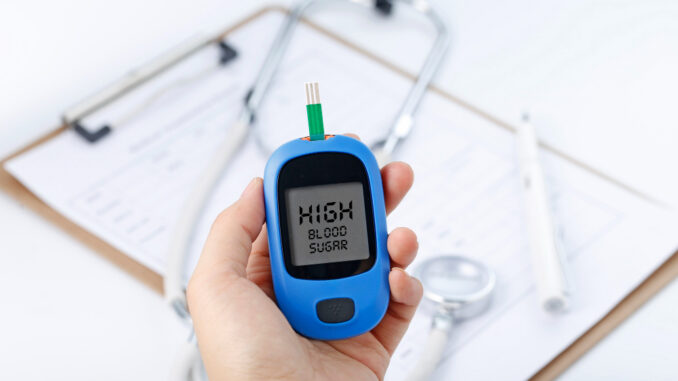
A plan to cut the NHS’s £15bn bill for treating diabetes patients is to be rolled out following successful trials.
The programme aims to tackle the issue with a diet that helps put diabetes in remission and prevent the need for costly medication.
Trials have been taking place over the last few years and the newest data indicates 32% of participants who stuck to the soup and shakes diet regime were able to defeat the condition.
The plan is tough to follow – three months of 800 calories a day consuming soup, shakes and healthy bars – and many can’t hack it.
Of 1740 participants enrolled in the Path to Remission initiative, 945 completed the 12 month diet which gradually introduces solid foods after the three months austerity eating plan. There was an average weight loss of 16 kgs.
Dr Elizabeth Robertson, Director of Research at Diabetes UK, said ‘Diabetes UK is proud to have funded over a decade of research that has forged new frontiers for people with type 2 diabetes and put remission on the map.
‘These latest findings add to the real-world evidence that the NHS England Type 2 Diabetes Path to Remission Programme can help thousands of people living with type 2 diabetes on their weight loss and remission journey, which we know is tough and having support is critical.
‘We hope to see even more people benefiting in years to come and an increase in referrals to the programme especially for people recently diagnosed with type 2 diabetes and in younger people where the impact of type 2 diabetes and remission from it is greatest.’
After the gruelling initial weight loss stage, patients receive support to reintroduce healthy, solid foods and maintain their weight loss, aiming for around 75% of their previous daily intake.
Support includes face to face meetings, group sessions and online activity.
The roll out will be offered to patients who have a diabetes diagnosis and a BMI of 27 or more. Blood sugar levels will also be taken into account. Consult your GP for more information.
Although not everyone is eligible, help is still available for those who may have pre-diabetes or be concerned about their weight and health.
In Southport, GP David Unwin, has been championing a low carb diet for his diabetes and pre-diabetes patients and has a 93% success rate. He has urged health minister Wes Streeting to focus on prevention not medication.
‘Any mechanism for achieving Type 2 Diabetes remission such as low calorie, low-carb diet or bariatric surgery must include the maintenance of remission long-term because that’s what really counts. How best to do this should be the next area of study.’
How I Did It – Harry Turnbull’s story
When my doctor told me I was not far off pre-diabetes it was a wake up call. It also meant I had an opportunity to tackle the problem before it got any worse.
After doing my own research I decided to go down the low carbohydrate route to see what impact it would have. I’m not sure I could stick to soups and shakes for weeks at a time or forgo that weekend glass of wine.
In the last 18 months I’ve jettisoned 14 kgs and improved other markers such as blood pressure. It entailed a new wardrobe too as tummy fat receded.
What I found after being delighted with the results is that I didn’t go back to overindulging, I was really keep to maintain the weight and my improved exercise activities.
To be honest, after a tough, start ditching all that toast, roasties and piles of rice it became quite easy, second nature. And it wasn’t hard. What I did was substitute those starchy and sugary staples with low carb and calorie replacements.

For instance pasta and rice is replaced with Konjac variations – very low calorie – and cauliflower rice. As for mash and potatoes, I now use celeriac, a much healthier alternative.
I got an air fryer to cut down on oil use and when I do use it I get extra virgin olive oil.
I also use sugar substitutes like erithrytol and stevia.
For snacking I was partial to peanut butter until I discovered even those very small jars that can be gobbles in a day contain 1800 calories. Now I occasionally buy peanut butter powder and mix it with yoghurt.
